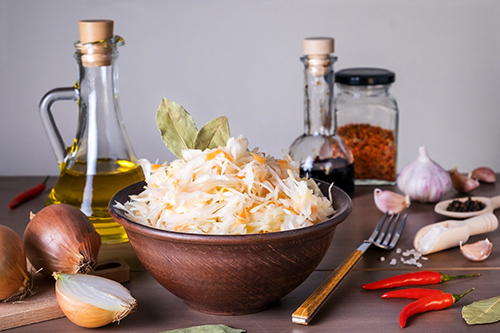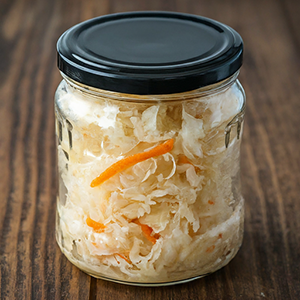
They are many sauerkraut health benefits. Although it is not widely consumed outside Germanic regions, its use is increasing because of its numerous medicinal purposes. The traditional method of preserving vegetables, particularly cabbage, is by fermentation with lactobacilli. Fermented cabbage is a good source of vitamin C during the long Northern and Central European winters.
Sauerkraut Health Benefits
According to Dr. Schneider, sauerkraut health benefits are probably due to its high level of natural lactic acid. This substance benefits such diverse ailments as arteriosclerosis, rheumatism, arthritis, and liver disease.
Fermented cabbage provides the following benefits to the body:

- It offers abundant vitamin C, with all of its attendant advantages.
- It eliminates toxic residues accumulated in the body’s tissues during the long winter months (depurant action).
- Digestive: Sauerkraut improves the function of the stomach and intestines. Although some feel it is heavy and difficult to digest, this effect is due to the sausages that often accompany it.
- It prevents pyrosis (acid sensation) in the stomach by stopping excess acid production.
- Improves evacuation and relieves constipation because of its high fiber content.

Naturally, fermented sauerkraut is preferred. Industrially fermented cabbage made using vinegar is inferior and should be avoided.
Fermented cabbage is an effective blood purifier (depurant) and should be included in the diets of diabetics and overweight people. There are many ways to prepare fermented cabbage or sauerkraut:
- RAW – This method best preserves its healing properties. It may be prepared with olive oil, adding small pieces of pineapple or apple.
- COOKED – After cooking over low heat for 20 to 25 minutes. It is eaten with boiled potatoes, potato puree, or soy products. These constitute healthful and nutritious dishes.
How to Make Sauerkraut
DISCLAIMER: All content on this website is presented solely for educational and informational objectives. Do not rely on the information provided as a replacement for advice, diagnosis, or treatment from a qualified medical expert. If you are pregnant, nursing, or have any preexisting medical concerns, talk to your doctor before using any herbal or natural medicines.
REFERENCES
- George D. Pamplona-Roger, M.D. “Encyclopedia of Foods and Their Healing Power.” George D. Pamplona-Roger, M.D. Encyclopedia of Foods and Their Healing Power. Trans. Annette Melgosa. Vol. 2. Chai Wan: Editorial Safeliz, 2005. 370,371. Print. [sauerkraut health benefits]
- Slavin, J. (2013). Fiber and prebiotics: mechanisms and health benefits. Nutrients, 5(4), 1417-1435.
- Plaza-Díaz, J., et al. (2020). Effects of a fermented milk containing Lactobacillus fermentum CECT5716 on symptoms and inflammatory markers in patients with irritable bowel syndrome: a randomized controlled trial. Nutrients, 12(3), 665.
- Parnell, J. A., & Reimer, R. A. (2009). Weight loss during oligofructose supplementation is associated with decreased ghrelin and increased peptide YY in overweight and obese adults. The American journal of clinical nutrition, 89(6), 1751-1759.
- Torres-Fuentes, C., et al. (2021). Gut microbiota in obesity and metabolic syndrome: current state of knowledge. Journal of obesity, 2021.
- Carabotti, M., et al. (2015). The gut-brain axis: interactions between enteric microbiota, central and enteric nervous systems. Annals of gastroenterology, 28(2), 203.
- Dickerson, F., et al. (2023). Fermented foods and potential effects on mental health: a scoping review. Nutritional Neuroscience, 1-17.
